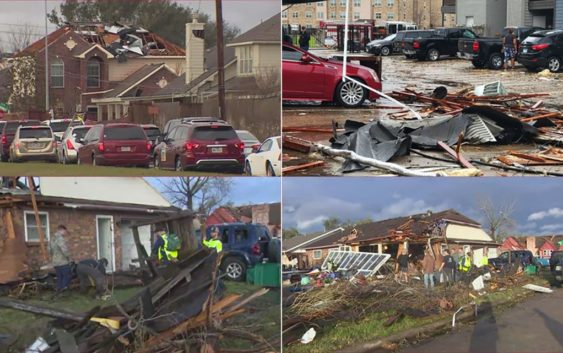- One year after devastating Panhandle wildfires, Canadian resident reflects on the work of rebuilding
- Hays County judge says software glitch caused some communication issues during wildfires
- FEMA deadline for Hurricane Helene recovery aid to governments, nonprofits extended
- Sellers and Rantanen are among the NHL trade deadline winners. Hurricanes and Boeser are some losers
- Hurricane forecasters express concern over NOAA job cuts impact
Here's how to file an insurance claim for tornado damage

If your home is one of the hundreds damaged by Tuesday’s tornadoes, you’re probably anxious to begin the process of repairing it.
HOUSTON — Texans impacted by Tuesday’s powerful tornadoes have begun the process of putting their lives — and homes — back together.
Whether you have extensive property damage or relatively minor repairs, you shouldn’t wait to contact your insurance company and get the ball rolling.
The Texas Department of Insurance offers tips for homeowners and renters.
First steps
- Call your insurance agent to report the damage. For company phone numbers, use TDI’s Company Lookup or call them at 800-252-3439.
- Take pictures and video of the damage. Don’t throw anything away until your insurance adjuster tells you to.
- Make temporary repairs to prevent more damage. Remove standing water. Cover broken windows and holes to keep the rain out. Put a tarp on the roof.
- Keep a list of the repairs and save receipts. Don’t make permanent repairs before the insurance adjuster sees the damage.
Filing a claim
- Keep a record of everyone you talked to with your company.
- Be ready to answer questions about the damage.
- Ask about an advance payment if you need help quickly.
- Ask about living expenses. Most policies will cover some of the costs you have if you are unable to live in your home because of damage that is covered by your insurance. Keep your receipts for these costs.
- If you need shelter or emergency food or water, contact the Red Cross at 800-733-2767.
Repairing your home
- Make sure your adjuster and company have your current phone number.
- Make sure your address is visible from the street. You may need to post a sign with your address in the yard.
- Try to be there when the adjuster visits and point out all damage.
- Get multiple bids from contractors and compare them with the adjuster’s report before settling the claim.
- Save proof that you paid the deductible on the claim.
- State law makes it illegal for contractors or roofers to offer to waive a deductible or to promise a rebate for your deductible. It also allows insurance companies to request proof, such as a receipt or canceled check, that you paid the deductible.
Avoid contractor scams
Disasters often bring out the best — and worst — in people and scammers are quick to take advantage of storm victims at their most vulnerable time.
“If the deal sounds too good to be true, it probably is,” warned Pasadena Police Chief Josh Bruegger.
Get more than one bid
Getting at least three bids will help you decide which offers may be too high or too good to be true. Your insurance adjuster can give you an idea of what the repair should cost. Bids should be on the company’s letterhead with a phone number and an address. Keep a copy of all agreements and warranty terms.
Watch what you sign
Read every document carefully before you sign. Scammers will try to get you to sign a contract by calling it an estimate or a release just to go on your roof. And don’t sign a contract with blank spaces. Shady contractors will fill in the spaces later with higher costs or work that’s different from what you wanted.
“The thing that is at top of mind, is the predators that are in our community that prey on the most vulnerable, the most elderly, to do nothing but steal their money,” Harris County Commissioner Adrian Garcia said.
Beware of misleading language
Don’t sign contracts that say, “Homeowner agrees to the listed repairs for the value of insurance proceeds.” If you do, the contractor gets every penny from your insurance payment. Make sure the contract lists the materials they’ll use. Keep an eye out for defective or low-quality materials while work progresses.
Don’t pay upfront
Be wary if a contractor asks for a large or full down payment. After a disaster, it’s against the law for out-of-town contractors to ask for a down payment before they start.
“Make sure you got the right documentation, the right identification, make sure you do some research with the Better Business Bureau but do not pay for any damage in advance,” Garcia advised.
Skip offers to waive your deductible
It’s against the law for a contractor to offer to waive an insurance deductible or work the deductible amount into a bid. If this happens, find a new contractor. You can also report it to the Texas Attorney General at 800-621-0508.
Resources and key contacts
More helpful numbers
Source: Texas Department of Insurance